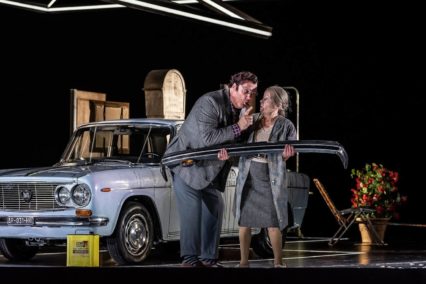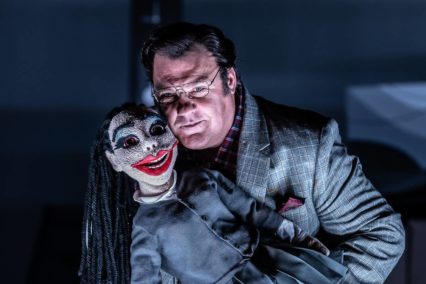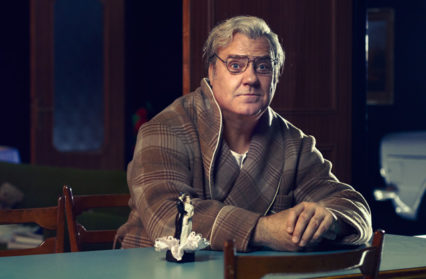David Truslove witnesses Bryn Terfel heading the cast for a new production of Donizetti’s comedy of domestic drama across two generations, Don Pasquale.

Encasing your lead character in an outsize corset or seeing an ageing bachelor outwitted by a young, scheming couple could have been hilarious. But comedy comes in many forms and at the Royal Opera House Damiano Michieletto’s modern-dress production of Donizetti’s Don Pasquale was laced with cruelty, pathos and occasionally laugh-out-loud humour. It’s a new staging that tries hard to ramp up its wit in what is generally regarded as the last great comic opera, but here it falls short of any genuine rib-tickling moments, arguably aimed at a younger generation than most of those at last Monday’s opening night.
Bryn Terfel, who made his Royal Opera debut as far back as 1992, has now added another operatic portrayal and whose roles at this address have recently included Boris Godunov, Falstaff and Scarpia. He seems a perfect fit for the elderly Pasquale, drawing our sympathy (or is it pity?) for his naïve dreams of wedded bliss. Instead of the supposedly mild-mannered Sofronia (aka Norina), introduced to him by the conniving Doctor Malatesta, he discovers a domineering party-goer with immediate plans for wallet-emptying home improvements. Terfel impressively negotiates his changing circumstances from initial swagger, as he disinherits his nephew Ernesto, growing impotence in the face of his wife’s tyranny, and pathetic descent into a shuffling pensioner confined to a wheelchair. At least a mobility scooter could have drawn a laugh and taken the edge off Michieletto’s hard-hearted interpretation. We really feel for Pasquale in Act Three when he succumbs to his wife’s scolding with a humiliating slap in the face – a moment that takes the shine off any comedy. That said Donizetti’s Don Pasquale is no lovable rogue like Verdi’s Falstaff who can laugh at himself. Here, he’s more an easily duped, parsimonious Uncle who attracts little consideration from those around him, least of all from his long-suffering house-keeper – a superbly cast mimed role and strangely uncredited.

Does all this suggest Michieletto and the set designer Paoli Fanti view this opera more as a tragi-comedy? Certainly, there’s little joy in the bare necessities of Don Pasquale’s shabby house – a few scattered possessions and a narrow bed to remind us of its single occupancy – and the cold steel surfaces after its luxury makeover do not convey domestic warmth. Above these props is the unremitting glare of a suspended neon-lit roof frame, its high-tech dazzle bringing sharp relief to a man approaching his dotage. But into this thought-provoking creation, Michieletto has artfully woven episodes of fantasy with dreamlike childhood reminiscences of a pyjama-clad boy blowing out birthday cake candles, and a bedside photograph of Pasquale’s mother that’s clearly a treasured possession. These scenes are as moving as they are striking, but is this someone with arrested development, unable to relinquish memories of the past, or someone merely wanting to marry his mother?
Belying his character’s age, Terfel sings with warmth and fulsome tone and, if agility no longer supports fast patter work, compensation comes with his stage-filling presence. He’s nearly upstaged by Russian soprano Olga Peretyatko, making an impressive house debut as the gold-digging Norina. She’s more than equal to the demanding coloratura and holds the eye too, clearly revelling in her transformation from modelling agency assistant, demure ‘convent’ girl to wily vixen out to fleece Pasquale. Her range of facial expressions are wonderfully captured in Act Two’s video projection scene – another clever directorial intervention fusing reality and fantasy – where she and Markus Werba as an amply sung Doctor Malatesta begin their plotting. The chemistry between them is so convincing you begin to wonder where her loyalties lie, and if she really is in love with Ernesto. As Norina’s steadfast lover, the Romanian tenor Ioan Hotea brings some uncertainty to the role with a reedy, effortful tone and a characterisation (an unkempt wastrel with a teddy bear) that seems to be a work in progress. This Norina is clearly only after his inheritance.
Three puppeteers provided some necessary light relief in Act Three during a scene where Pasquale’s lackeys’ muse on his woes, but the ending feels harsh in the swiftness of his placement in a nursing home with the company of his ever-faithful servant and now carer.
There was much to enjoy from the Royal Opera orchestra with Evelino Pidò drawing stylish playing and much momentum across a musically rewarding evening.
Don Pasquale is a comedy of domestic drama across two generations by Donizetti. For more information, click here.
David Truslove contributed some significant pieces to Wales Arts Review.
The Production’s Credits
Cast
Don Pasquale – Bryn Terfel, Ernesto – Ioan Hotea, Doctor Malatesta – Markus Werba, Norina – Olga Peretyatko, A Notary – Bryan Secombe
Crew
Evelino Pidò – Conductor, Damiano Michieletto – Director, Associate Director – Gilles Rico, Set Designer – Paulo Fantin, Costumes – Agostino Cavalca & Lighting – Alessandro Rocafilm
Chorus & Orchestra of the Royal Opera House.











